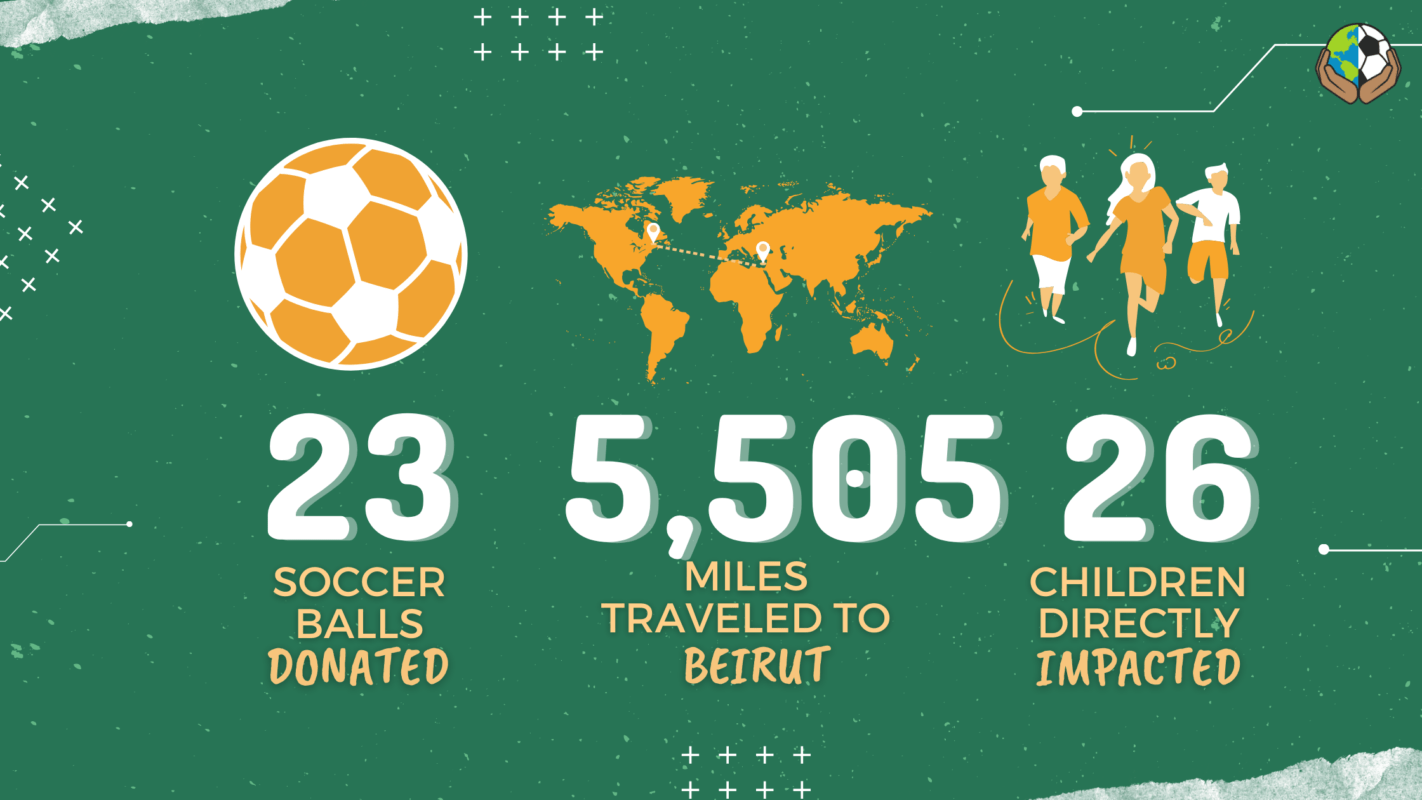Beirut, Lebanon
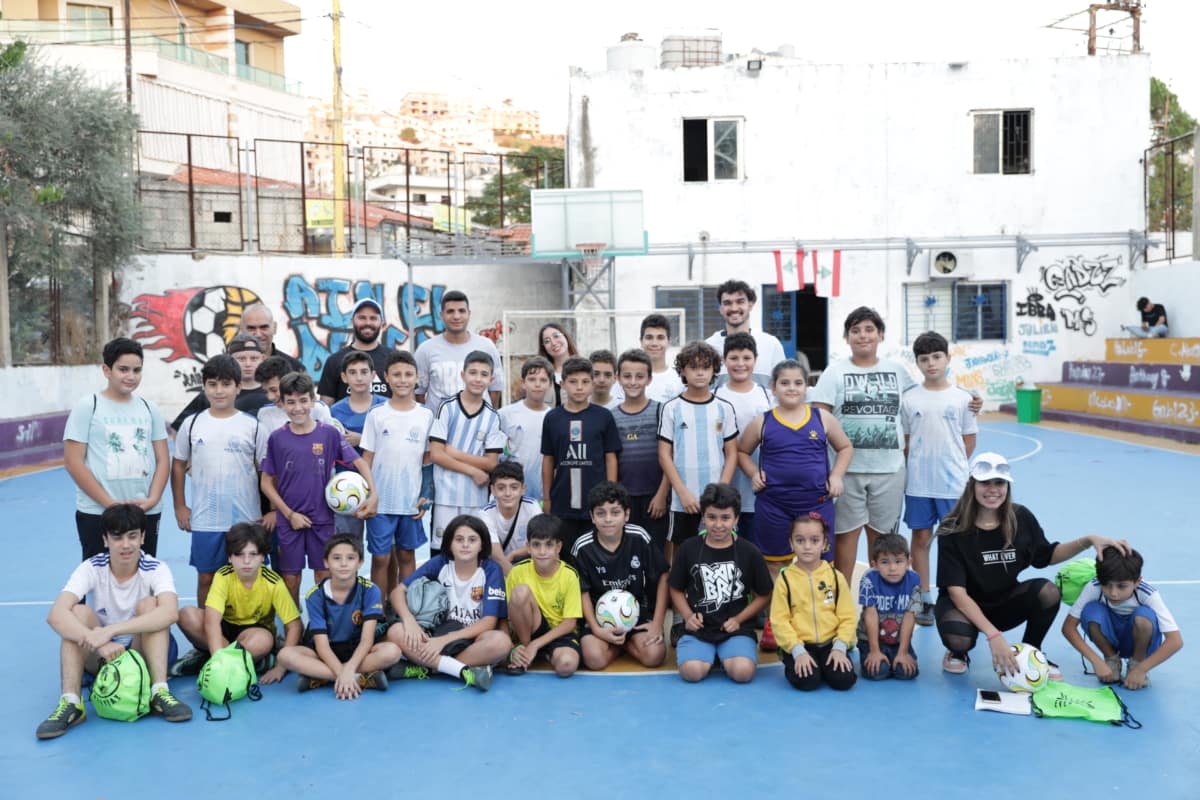
To accurately tell the story of this next program, I have to travel back in time to earlier this summer. The date was July 19, just a few days before my birthday. At the time, I was home in the U.S. and I was scheduled to speak with a group of kids through a partnership between the Marshall Legacy Institute and the U.S. Embassy in Lebanon. These were pretty big names to throw around and some even bigger names had been a part of the ongoing lecture series called “Peace Through Sport”, so I’ll admit I was hesitant at first and knew I’d be feeling very much like a fish out of water.
Only reinforcing that point, my contact with MLI, Anne, had told me who the previous session’s speaker was – no other than Kyle Beckerman – a longtime MLS legend and a mainstay with the US Men’s National Team during his playing days. Luckily, I knew that this concept of “Peace Through Sport” was central to Around The Worlds’ mission and could only hope that the kids tuning in would find benefit in the messages I shared. Those messages though? They were themselves TBD since I had prepped nothing but one small sticky note for the hour-long presentation. On that note – the five lessons I had learned through the now eight year long journey of Around The Worlds. Among those lessons – value collaboration, be flexible, be open to learning, etc.
As the kids, accompanied by some master trainers, would be having discussions about the concept of peace through sport across a multi-week program, I figured there just had to be parallels between our work and theirs. They were to finish the eight-week program by coming up with their own service project and implementing it within their community. Basically – finding a need, addressing it, and creating a solution in order to aid or ameliorate that need. As I spoke very much off the cuff, I truly valued the input of our lecture series participants. I hadn’t done a talk about Around the Worlds for nearly two years and I forgot how much I really missed it.
Alas, it was a talk through a computer screen and those are far less engaging as one on a stage and in-person, but I made the most of what I’d been given. We had a group tuning in from a foster system based organization in Baltimore, and then a big number of participants calling in from Lebanon. No matter what country they hailed from, each kid was just as engaged as the next. As my near hour-long chat wrapped up – Anne quickly opened up things into a Q&A session since of course the kids had plenty of questions after I had talked their ears all the way off. Some questions were surface level and light-hearted, while others – whether asked by kids or the trainers, had considerable depth.
“Stephen, what is your favorite football team?”
“Who is your favorite football player?” soon followed.
“Messi or Ronaldo?”
I answered every question because there’s no such thing as a bad question, especially when uttered from the mouth of a child buzzing with curiosity.
“Coach, do you ever have girls participate in your programs? Or just boys?” asked a young girl, timidly, as I was quick to address the inclusivity of not just our programs, but the game of soccer in general.
Hammering the point home, I mentioned our many all-girls sessions spread across Mexico, the Philippines, the Dominican Republic, and more. Her video camera had been switched off but I could only imagine a smile on her side upon hearing this response.
“Stephen, Mohammad here. A big fan of your work and allow me to thank you on behalf of us here in Lebanon for all that you do,” shared a charismatic man around the same age of me – who was also serving as this session’s master trainer. Pleasantries out of the way, he then posed a question – “Stephen, what is the main takeaway you hope that beneficiaries receive from your sessions?” It was an extremely poignant thought and I tried my best to give it an equally well-thought out response in return.
Hoping to wrap the talk up with a nice, underhand throw of a question – I called on one boy from the chat – a young fella in Lebanon.
“Stephen, how many countries has your organization been in?” he asked.
“52,” I answered with a big smile.
Surely, there was going to be a follow-up… I mean, there always is.
“Would you ever consider bringing your program to Lebanon?” the boy said, optimistically more than anything. The truth is, I hadn’t. Not even a little bit. But at the same time, I know kids and I know how they work, and so I decided to play the game.
“Sure!” I responded, appeasing their curious minds but hardly putting much extra thought into it besides that.
Well, that was it. Anne drew the whole call together and to a close, the kids applauded, and I turned off my camera just after thanking them all for their time and their ears. And that, there, was all she wrote. At least that’s what I thought. Fast forward about two months from that fateful July day. I woke up with a thought – remember that kid who said would I ever run a session in Lebanon? “You know what I should do… I should try and run a session in Lebanon,” I said to myself. Honestly though, I had no idea who to contact. I threw out a couple feelers – an email to Anne just to gauge how possible it might be. Then, I received a message from the group’s master trainer – Mohammad.
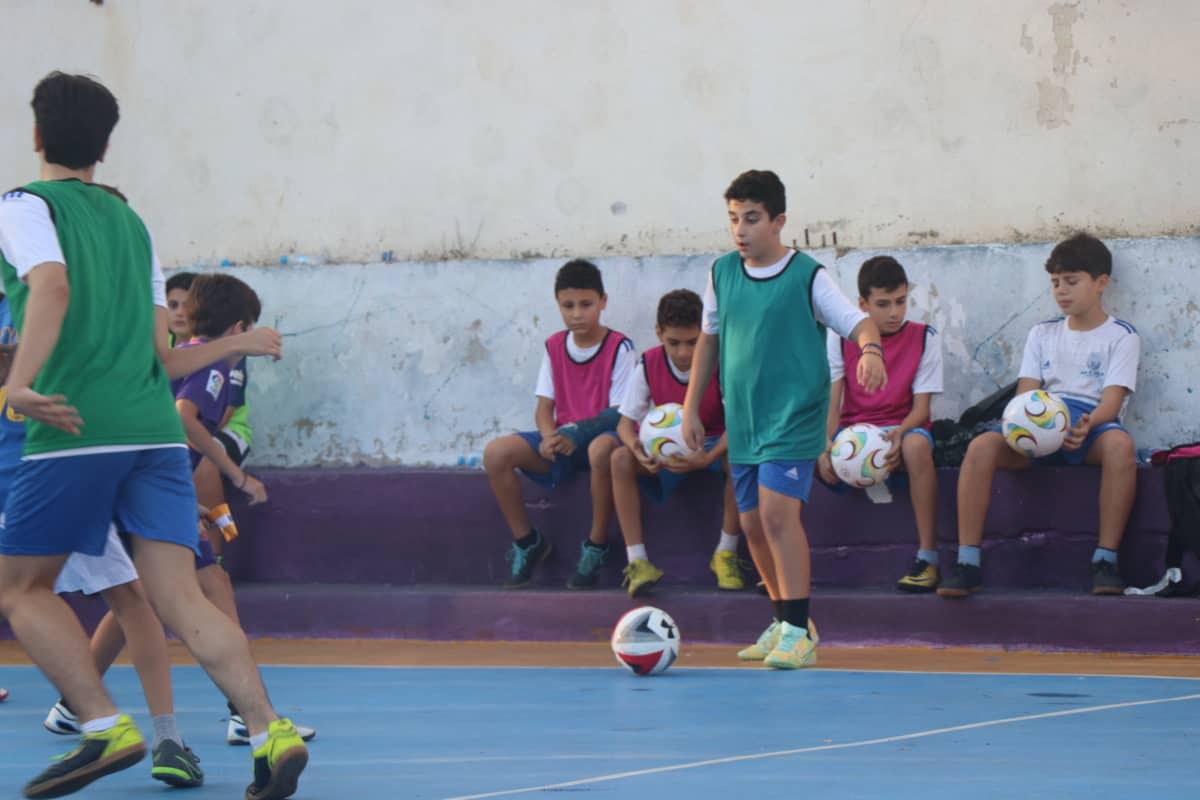
I was optimistic with both conversations and truly hoped something might materialize. Mohammad, as expected, was world class about it.
“We can definitely make it happen,” he said. “Just call me as soon as you are here and I will set everything up. Equipment, cones, a field, you just name it and we will have it for you.”
I was blown away, so I immediately booked a flight to Lebanon and sent him my travel details. It was cool to think that I wasn’t all talk here, not just with the kids, but with the bullet points of my lecture as well. Some of those lessons were already on display here. Remember, value collaboration was one of them.
So I’ll admit, the whole ideal, in-a-perfect-world scenario was a bit lofty, but what has Around the Worlds been if not for an endless stream of countless lofty goals dreamed and then ultimately realized. Remember those kids I had spoken to? Remember their service project? Well, they expressed so much interest in our programs and I hoped that while in Lebanon, we might be able to get a cohort to help us out. The kids, doing good in their communities, through football, with an international collaborator. It seemed like a home run, right? Seemed like it ticked all the boxes.
“Unfortunately, the kids have wrapped up their eight-week long session,” Mohammad told me ahead of my flight to the Middle East.
On one hand, I was bummed. The story itself would’ve been amazing. Talking to the kids about the work and then 3 months later doing that same work alongside them? I was stoked. But life is like that, isn’t it? Because truly, on the other hand, I was happy. The kids had completed their program. They had held an awesome service project they had all agreed upon that was benefiting members of their community, and their community’s disabled population, especially. These kids were amazing, and I knew that just from the hour-long talk I had with them many months prior.
“No worries though,” Mohammad reassured me. “We will coordinate it through a large-scale NGO with branches here in the Middle East – Anera is its name.”
Mohammad and I scheduled a two-day event with a recurring group of 20 beneficiaries. It would be an hour and a half of football activities each day. Then, following the sessions, the kids would be leaving with some gifts – bags and balls courtesy of Around the Worlds, and snacks and refreshments courtesy of Anera & Co. Though it wasn’t exactly as drawn up, it was still a perfect plan. After a month of excitement and anticipation, I landed in Beirut. As instructed, I called Mohammad as soon as I landed.
“Welcome to my country!” he said, excitedly.
It was a Monday and our first session was scheduled for Wednesday. I prepped some footballs, crossed some i’s and dotted some t’s, with Mohammad doing much of the same on his side. Unfortunately, due to unforeseen circumstances, our Wednesday schedule was postponed. “We will do it on Thursday… is that okay?” asked Mohammad.
There was an apologetic tone in his voice and this was only confirmed as he continued – “I hope you’re not angry about this schedule change, especially after traveling all this way.”
I read the text and tried to put him at ease as quickly as I could.
“No problem bro! These things happen. I completely understand.”
Still eager to make things up, Mohammad insisted on driving into the city so we could meet up for dinner. It was a more than generous offer and I quickly agreed to it, as we hit up a nearby mall for a traditional Lebanese meal. Hummus, pita bread, fattoush, spicy potatoes, kebabs, and a Lebanese staple – grape leaves (warak enab – leaves wrapped around lemon soaked rice and tomatoes). Delicious. I ate until I was full, and then some.
Throughout the meal, we shared some great conversation, stopping every once in a while just to reflect on how crazy things were. “Imagine bro? Three months ago we were talking through a screen,” I started.
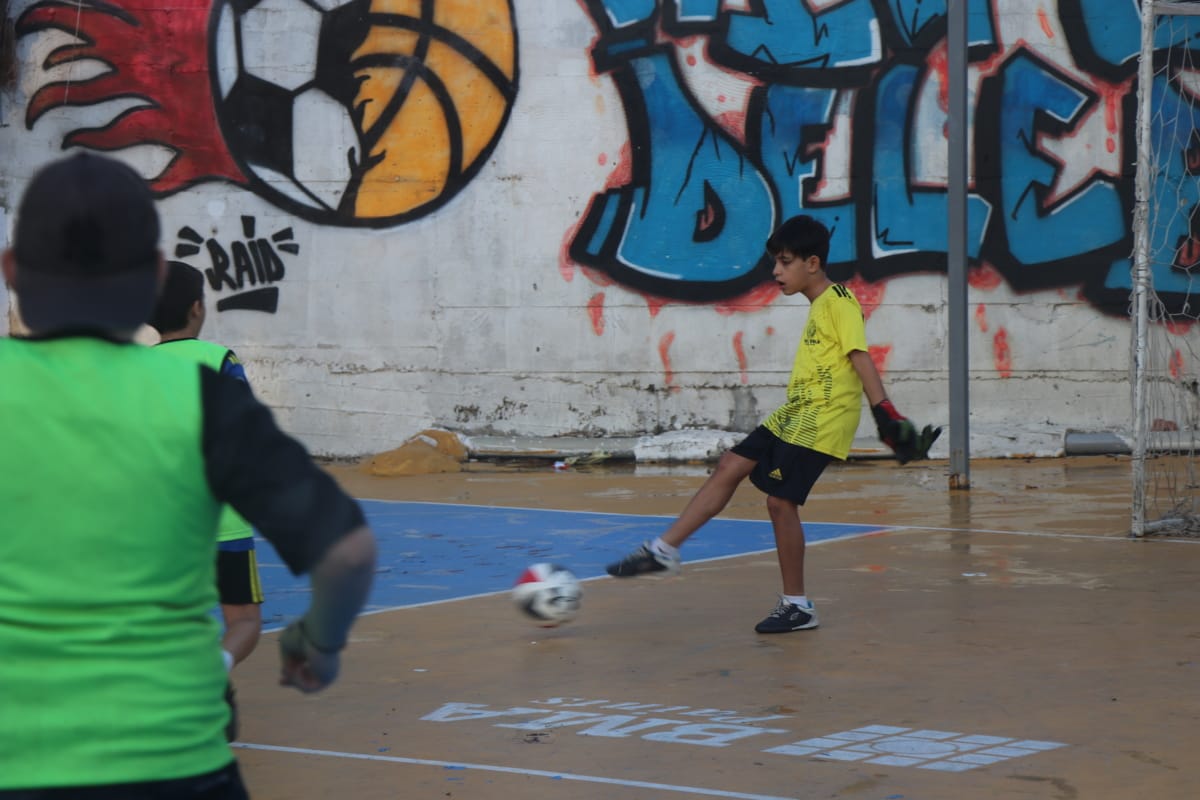
I continued. “The kids were asking if I’d ever come to Lebanon and there I was, lying, and saying yes. But here I am. Three months ago chatting through a screen. And now, three months later sitting three feet apart and sharing a meal. Man… life is kinda beautiful like that.”
Both of us were more than stuffed, the check came and I offered three times to pay for it. “It’s on me,” said Mohammad. “I invited you.” He hit me with the Mido play just like in Egypt.
I thanked him for dinner and we snapped a pic to send to Anne. Surely, she wouldn’t believe it without seeing a picture of us together either. We discussed the plan for Thursday, it would be just like Wednesday’s only a day deferred. After all, that’s how postponements usually work.
“At 2 p.m., our driver, Mario, from Anera will pick you up. He speaks very good English. Instructions from there will follow,” he said. “Got it!” I said, looking forward to the following day already.
Well, Thursday came around and with it, a thunderous bout of rain. 8 a.m., downpouring. 9 a.m., the same. 10 a.m. too. I called Mohammad in a panic. “It’s not raining anymore here in the south so let’s monitor things,” he said.
Early afternoon rolled around, and with it, an unfortunate call from Mohammad.
“Hey bro, bad news… it’s raining here again. We have to cancel the session and try again tomorrow. Plus, the route to the organization is quite flooded. They say it’ll be nicer out tomorrow, though,” he said, making sure to leave on an optimistic note, though the past two days’ events had left me feeling more cautious than anything.
I rolled into bed and called it a night… for tomorrow we’d be trying our luck yet again.
I rolled out of bed. Blue skies. Sun. Amazing! I was optimistic, but warily so.
“Hey Stephen, good morning,” Mo texted. “So today we are still coordinating things, but you will either be picked up at 2 p.m. or noon.”
Evidently, there was some movement in the streets so we were trying our best to navigate around it. I waited for Mario’s call but was instead greeted by another Anera contact, Aya.
“Hey Stephen! It’s Aya. We will be picking you up around 3 p.m.. Is that okay?” she asked.
“Of course! I’m ready,” I answered.
In the car and heading towards the venue, a community center located an hour south of Beirut in a suburb called Sidon, we went through the day’s agenda. At 4 o’clock, the session – kicking off with the filming of a promo vid and interview for the Anera folks. Then, the session itself was for about 20 participants and was held until around 5:30 PM. Then, a ride back into the city from the suburbs for a nice Lebanese dinner between our teams.
“Deal!” I said. I was excited, especially after how the past two days had unfolded.
Time ticking down on our 45 minute commute, Aya mentioned a similar comment to Mohammad’s from the other day.
“Stephen, I’m so sorry for everything happening in my country right now – we could’ve never expected this.”
I let her finish her point and then quickly echoed something similar to what I had said to Mohammad. Actually, Aya was in our lecture talk back in July as well – she had remembered me though my, at the time, unshaven, face looked different back then.
“You look Arabic now,” she said.
“Aya, do you remember my lecture from back in July?” I asked. “I shared a couple lessons back then… one of which was to be flexible. This, all of this, it’s part of that,” I said, rolling with the punches as we so often have to do.
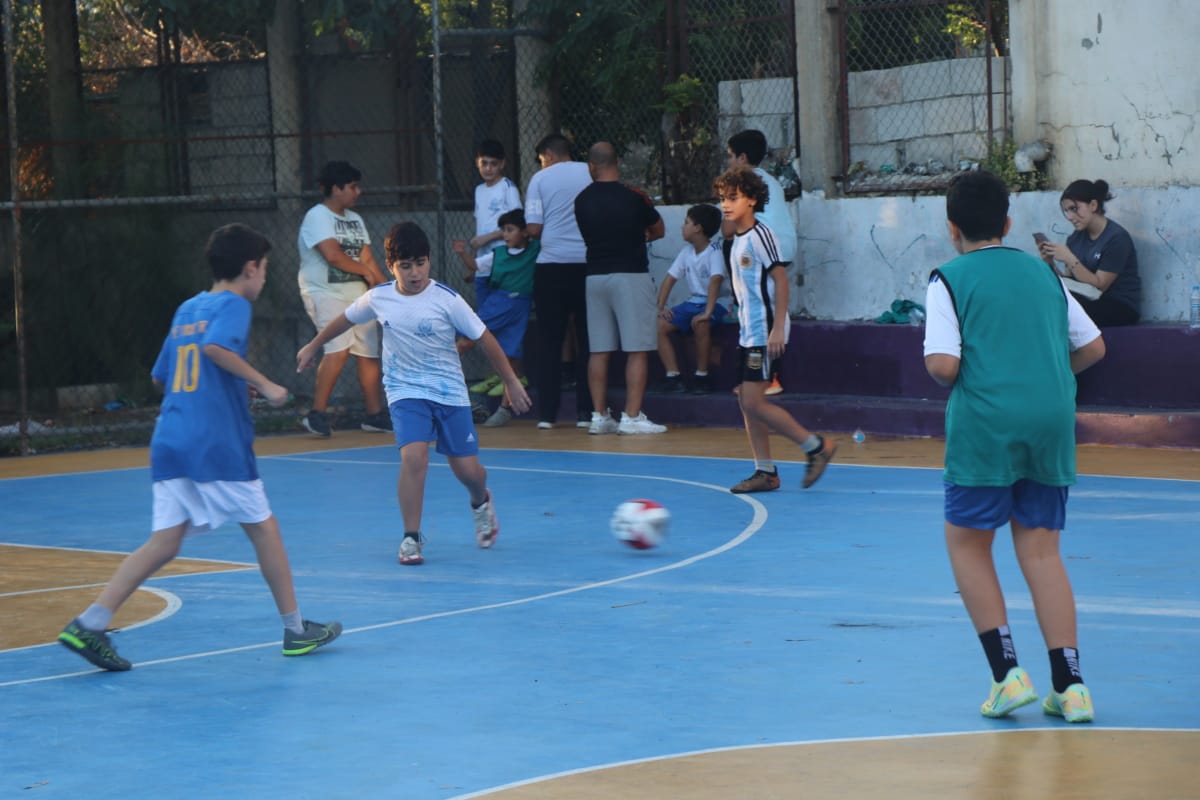
Finally, we pulled into a little parking area outside of our venue – a nice multipurpose basketball and futsal court. On it, nearly two dozen youngsters decked out in their footy best – matching jerseys, pristine boots, and more. Some were kicking around, some older folks were shooting hoops, and some very helpful young athletes were sweeping some water off of the court – I guess the court had a drainage issue and was still very much recovering from the prior day’s heavy rains. Anera’s communications coordinator was already present and he quickly gave me a run-through of the promo video so we could film it ahead of the session. He’d then grab some shots for b-roll and overlay the audio in order to create a masterpiece.
“What motivated you to come here to Lebanon?” was his first question.
His second, “What do you hope to achieve with this session today – what do you hope the kids might take away from it?” ala Mohammad circa July 2023.
We filmed the video in a little more than one take and I ran over to the kids, all sat patiently on a two-level bleacher set in front of our already set up listening exercise. Assisted by two coaches and the team’s main director, I had the kids fall into groups of two and we jumped into the listening drill. First, just like in Egypt – the kids were to use their eyes as it was fully acted out in charades. Next, using their ears as my mediocre Arabic took center stage. Aya had me sweating as she said that Lebanese Arabic is different from traditional Arabic. So honestly, some of my translated body parts were useless since they didn’t match up here in Lebanon. Regardless, we got a good laugh out of it and I managed to select a captain, a young boy named Charbel, to help me out and run a few rounds. With the listening exercise exhausted, I moved over to three even teams for relay races, making sure Charbel’s leadership was on display as he demoed some stepovers and other techniques.
Quickly moving from that, in order to save additional time at the end for a scrimmage, we broke into three technical grids run by myself, and the other two coaches, who themselves were brothers. I was grateful for their help and for the command they had over the players. We ran through push passes, volleys, half-volleys, headers and more. Following a quick water break with bottles provided by Anera, we broke into one final drill before a much-anticipated scrimmage – 1v1s at goal.
A young fella deployed in net and two teams lined up in front of me, I took turns blowing my whistle and rolling a ball in front of the kids – themselves rushing as quickly as possible to arrive at the ball and either rifle a first time shot into the net or perform a skill move past their defending counterpart and then strike towards goal. We ran a couple different variations of this before calling it quits in order to scrimmage for the last 25 minutes. As I shifted roles from coach to referee – I enjoyed chopping it up with the kids in between small-sides games. They were excited to show off their English and me and my poor grasp of Arabic surely were thankful for it.
One boy approached me and gave me his name, Zahar. “Coach? What is your name?” “Stephen,” I answered. “You are a very good football coach,” said Zahar. “Thank you bro! You are a good football player,” I responded, chuffed at the compliment.
Other kids, much like Zahar, were just as curious. “Coach? How many academies do you have?” one asked.
“Where are your academies, coach?” asked another, eyes widening when I told him our programming had now spread to 54 countries in total.
“Do we have a training session with you tomorrow?” said another team member, apparently thrilled with how the day’s session had played out.
Charbel entered the fold with some of his own questions. “Coach, are you a professional?” “Did you play in university, coach?”
Some were footy related but some very much were not – “Are you a Tik Toker?” “Do you have a YouTube channel? Instagram?”
I entertained them all while heading back to my central position as ref. Goals were scored, some more magnificent than others, but at the end of the day they all count just the same. We were drawing very close to our 5:30 ending time and I knew we still had some giveaways for participants, so I blew my whistle and circled the kids up. We had planned for 20 participants but didn’t want to turn away anyone interested in playing, so that 20 extended more towards 30 by the end of the session. As a result, we would not be giving each kid their own ball but (luckily, with some groups of siblings) we would instead be giving one to each household. The rest would all be leaving with new drawstring bags.
Gifts in hand and smiles on their faces, the kids retreated to the bleachers for cupcakes and juice boxes yet again courtesy of Anera. A well-deserved treat after a session full of energy and hard work. I was left chilling at center court where I heard the kids yelling out some instructions:
“Coach, do an around the world!” one yelled out.
I responded with four consecutive ones and they responded with a chorus of applause in return.
“Coach! Hit the crossbar!” yelled another.
“Coach kick it into the basket!!” This one certainly the hardest ask of them all.
“I can’t do that!” I responded, but figured I’d at least try. I juggled the ball 4 or 5 times, popped it into the air, and hit an inside of the foot volley from half court.
It ricocheted off the backboard and dropped through the basket. Somewhat surprised but somewhat not surprised at all either, I looked over to the bleachers for some sort of affirmation. The kids were all distracted, more interested in their cupcakes and juices than what I had just done.
I yelled out “Come on guys! You told me to score a basket and I did!! First try too!!”
Our driver from Anera, Mario, laughed and said, “nobody but God saw that one bro, that’s between you and Him.”
Now well past our scheduled ending time and safety (or the lack of it) a looming threat, we packed things up quickly and peeled out – waving goodbye to the kids, coaches, Mohammad, and Anera’s videographer, Hisham. Like I said, we had hoped to have dinner after the session to celebrate.. but safety was more important in this case. Luckily, we all remained hopeful that that dinner would still happen given the three additional days I had in-country. Sunday rolled around and I got a WhatsApp notification. A new group chat. In it, Mohammad and Aya.
“Sunday go-out” it was titled.
We were planning to go out for a late lunch by the water – at the swanky Zaitunay Bay. Aya was the first one there, followed by myself, then later, Mohammad and his wife – also Aya. We feasted on a traditional Lebanese meal filled with fettoush, tabbouleh, mtabal, spicy potato, grape leaves, kebab, and hommos. Just like my first meal with Mohammad, the food was great and the conversation was better. It was an inspirational exchange of thoughts – a reflection on the week’s session, the promise of change, and the potential of collaboration. Mohammad had so perfectly put it as a “pilot program” between our NGOs. Aya knew that in different circumstances we really could’ve done something huge. In the east, in the west, north, south, in refugee camps and more – these programs had benefits for Anera’s beneficiaries and well, as for me, I was always down to run sessions and provide much needed resources in conjunction with them.
We tabled things as such and I left the conversation optimistic that when dust settled we could really look at doing something much bigger. I enjoyed the conversation both as a speaker and a listener, hearing everyone present share about our own why’s. I told Mohammad that one of the most beautiful things we can do as teachers is “teach a kid a life skill without them necessarily knowing they’re learning a life skill.”
He took over from there, finishing the thought thanks to years of training experience, “we don’t even tell them what skill we’re working on. They complete the activity and then we let them evaluate and determine for themselves what exactly they learned or took away from the program.”
“I love that,” I said, knowing just how much value can come from such an exercise.
We all had very different life experiences, but the commitment to our craft seemed linear across the board. Mohammad himself, had grown up in a camp and I could see firsthand the desire he had to make sure other kids never experienced the things that he had while growing up. Aya had experienced and seen all the things that come with a bevy of experience in the humanitarian field – “I can’t look at people as numbers or cases, I have to look at them for what they are – people.”
She prayed that the work never became robotic and in her emotion in sharing the sentiment, I truly believed those words. We spoke about proposal building, about our favorite triumphs and stories. Mohammad shared some of the core values they look to deliver through their lessons, mainly: empathy, cooperation, creativity, communication, participation, self-management, respect for diversity, and problem solving. As is always necessary in this field, I wanted to reflect on Friday’s session. I sought feedback, on both sides of the coin both positive and negative.
“Be honest with me, Mohammad, how did it go? What were your thoughts?” I asked.
“Listen, Stephen,” he started. “I have some feedback from the director and from Elissa (another staffmember at the cultural center). And that is, that the kids enjoyed it (the training) very much.”
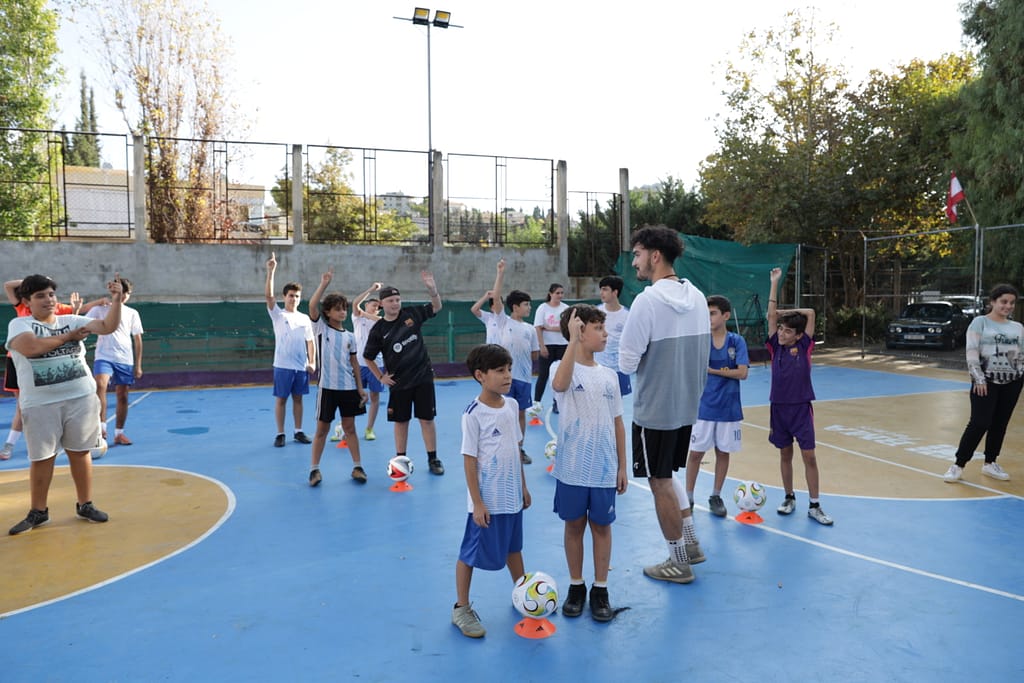
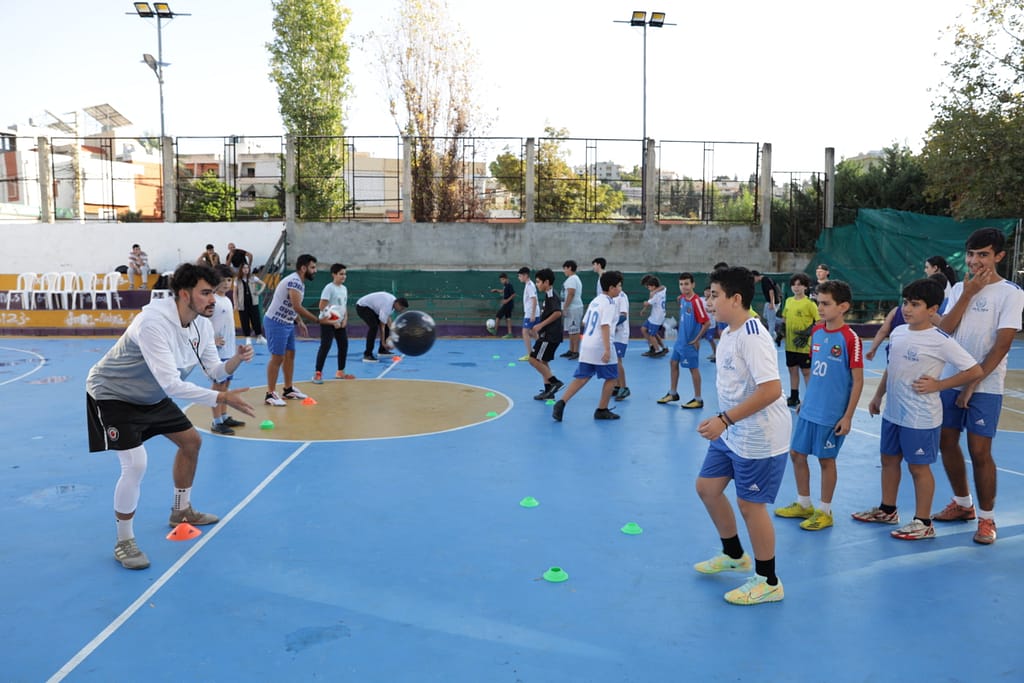
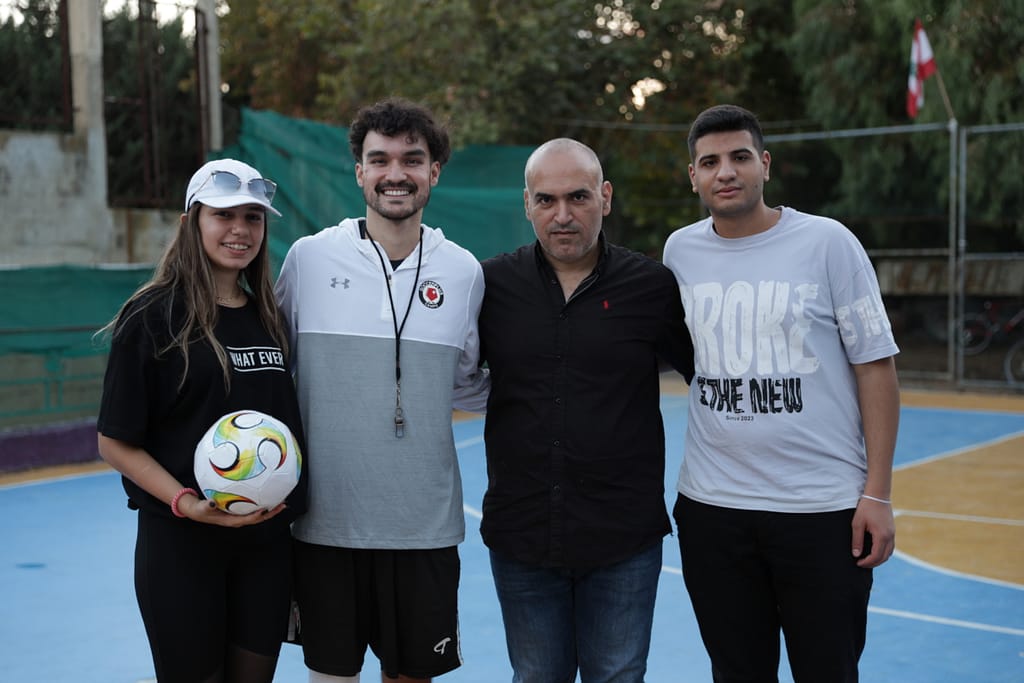
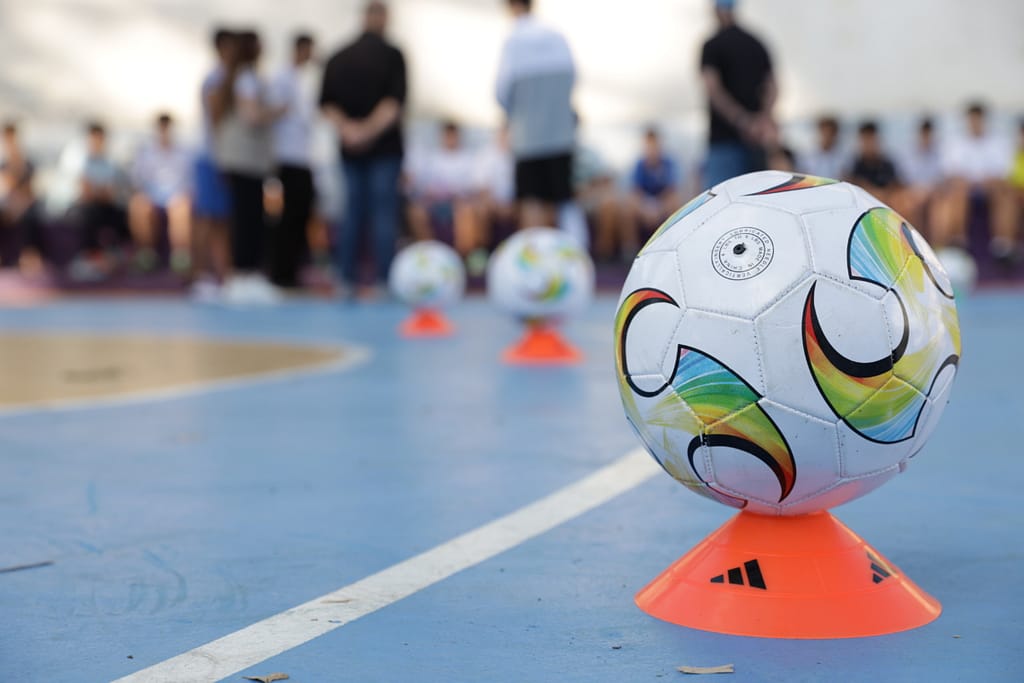
I let out a sigh of relief, confident that the training had been beneficial but still we can never be completely sure how it is received. Mohammad continued, “Moreover, the director was very happy because it was a higher level of instruction which the kids are not fully accustomed to. So they were able to experience new exercises and techniques and they got a lot of value from that.”
My ego all the way inflated already, he continued onwards. “The director mentioned that you were very passionate and dedicated to your work as a coach and he especially appreciated you devoting a concentrated focus on the players utilizing both feet during the session in your grid work.”
I was thrilled to hear such positive feedback, and knowing Mohammad and his character I trusted that had there been constructive points he very much would have shared them, honestly and earnestly. Monday rolled around and I found myself sitting at Beirut’s international airport. My stomach was full of hummus. My bags that were filled with soccer balls and equipment were now empty, housing only two weeks worth of dirty laundry. In my phone, a lifetime’s worth of program photos, and in my mind, as many memories to match. It had been a long and exhausting two weeks, and I was ready to head home. I was leaving with a grateful heart. One that was thankful for the connections made, the kids taught, and the memories created.
